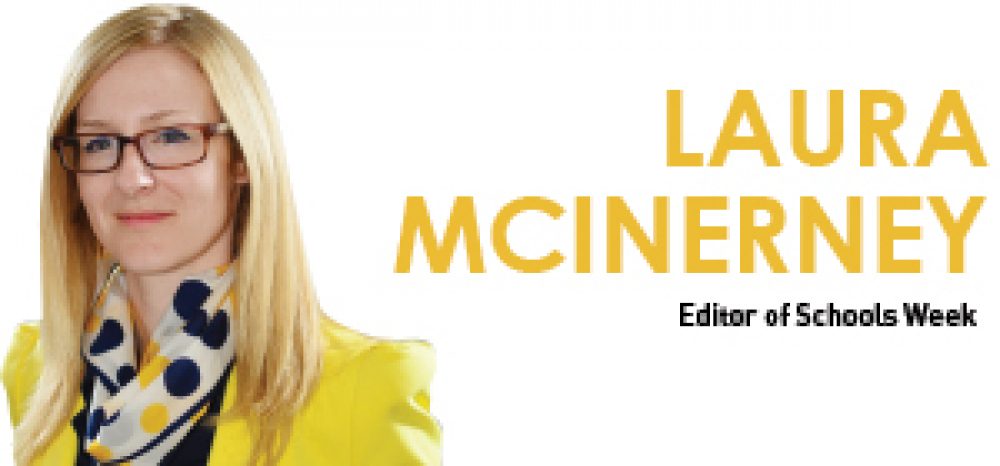Do you remember last Saturday? It was boiling hot and the world was sunny – not least because Nicky Morgan had announced on Friday afternoon she wouldn’t be making all schools into academies after all.
Except, it wasn’t that straightforward. (It never is).
At 6.30am on Saturday I therefore found myself explaining to listeners of BBC Radio 5 Live that this was less a u-turn, and more a “z-turn” in which Morgan had taken a step forward towards a whole-academy system, then a step back, but there was a crucial third step to which we now had to pay attention.
As our analysis lays bare, under the new plans two types of areas will have all their schools made into academies: those deemed under-performing, and those whose finances are so low they can’t sustain a school improvement service.
The councils deemed under-performing will be blamed for their poor schools and told that academisation is all their own fault. The ones with low finances similarly so, even though squeezed budgets are not their fault.
The z-turn plan is a clever one because it means Morgan gets to have her own way – an all-academy system – but instead of everyone pointing their pitchforks at her, she can point them at everyone else. “Not my fault your schools are hopeless,” she will say. “Not my fault you can’t manage your money responsibly.”
One positive consequence is that the academy land grab might now quieten a touch. Last month, after Morgan announced her original plan, over 200 schools applied to “voluntarily” convert status. That’s the highest number, by far, since 2011 – with the monthly average around 50.
Knowing the DfE’s internal processes are not always tip-top (that’s not conjecture, by the way, that’s based on independent audits and a plethora of performance statistics), I presume the influx of applicants was tough to deal with. Due diligence and careful accounting is vital to avoid the sorts of problems we saw last time many schools converted in 2011. Both take time and manpower, something lacking in the department and which wasn’t adequately increased to take account of the sudden all-academy plan. The z-turn should slow that pace to something more manageable.
What’s worse about the new situation, though, is that it raises the uncertainty level for the average classroom teacher. When everyone was expected to convert, heads could take their time, pick a sponsor, discuss with staff, develop things at their own pace.
Under the new regime it will feel to teachers as if Morgan has a sniper roving over England looking for the next council she can take out – and if you’re in that council, even if you’re in an outstanding school, that’s tough! You’ll be taken
out anyway.
This uncertainty is leading to the sorts of behaviours more akin to political backroom deals than schools: heads promising their schools will go in with each other as long as everyone agrees to keep out a competitor school, over-generous financial offers to primaries with
lovely intakes, a shunning of schools with buildings too expensive to maintain.
Among teachers it is also contributing to further concern about pay and conditions. As our story on page 8 shows, academy trusts are starting to look at their budgets and where they don’t stack up across schools, redundancies are being made. It’s not a folly to believe that if an academy trust takes over the place where you are working you could be caught in a similar situation. Even if you’re not, the pay and conditions flexibility of academies mean wages are less protected than they were.
Still, at least the sun was shining last weekend. Even Nicky Morgan couldn’t change that.



Laura, you are right that having failed to break down the front door Morgan and Gibb are trying to creep in around the back. However their agenda, effective privatisation, is now up and in public view and the job now is to keep it there.
Here is a link to the TUPE advice and guidance as I suspect many teachers in Academy chains may need it?
http://www.acas.org.uk/index.aspx?articleid=1655
The government are using school improvement as a weapon and hiding behind a “school-led” system to centralise everything.
We even allow them to get away with blatant lies. “We’re giving funding direct to schools cutting out the nasty LA middleman”. Ah,… no they’re not. They are replacing the far from perfect but thoroughly tried and tested LA middleman with a new and largely untested middleman, the Multi-Academy Trust or MAT. The MAT has far greater powers to subvert funds from individual schools and they don’t even need to have an empowered governing body at each school to hold them to account – just an advisory body.
In theory these MATs are overseen by RSCs or even the SoS herself which is fine as long as they don’t actually need any oversight, but the recent Willshaw report shows that as soon as MATs go off track there is no real oversight and some of the largest MATs perform worse than the worst LAs.
What we need is a programme whereby once MATs get into trouble, we have a forced re-entry into the mainstream LA system, and the Directors (and overseers) spend some time at her Majesty’s pleasure breaking big rocks into little rocks – just to encourage the others you understand?
Seriously though, whilst the very best schools can improve without interference and only very occasional inspection, schools in need of improvement should not be given funding to find support wherever they choose.
School improvement should be a separate fund based on the state of schools rather than pupil numbers. A County with more struggling schools should get more money to turn them around. Whilst a body like an LA should be responsible for brokering outstanding resources to meet struggling need, it shouldn’t necessarily own those resources itself. Indeed, this is a business opportunity for outstanding schools to earn more money, and the brokerage process should be overseen by education leaders (a new function for Schools Forums maybe). If we can have the notion of school improvement, why can’t we have nursery improvement, college improvement? Why can’t we have a joined up system of education for 2 to 19 years? Outstanding educators should be the resource of education improvement, and the brokerage of skill to meet need should be overseen by outstanding educators too. This is governance of education by education for education. Education/school improvement is the hub around which it all revolves.
This is one area where Academisation makes sense. We absolutely do not want to import ruthless business practice into our classrooms where pupils are reduced to statistics and KPIs, but the conversion of struggling schools into good or outstanding schools can be as efficiently business-like as it can be.
The self-improving school system seems to suggest that Clusters (MATs, umbrella trusts etc) can manage improvement themselves with outstanding schools helping struggling ones, the MAT distributing the money fairly etc. If this model was workable, you wouldn’t need to turn schools into businesses; the whole lot would run on love and community spirit (an extension of the classroom if you will). Either the Academy system is hopelessly naïve or it is a cynical attempt to get yet more for nothing from teachers.
Education improvement should be highly valued. It should be one vehicle for outstanding organisations and outstanding teachers to earn the outstanding remuneration they deserve. In theory, as struggling schools are improved, the need dries up, but the skill is the same required to grow new teachers and the intellectual property involved is potentially a national asset to export outstanding teaching to the rest of the world. A business approach has a very long way to go before it need worry about making itself redundant.